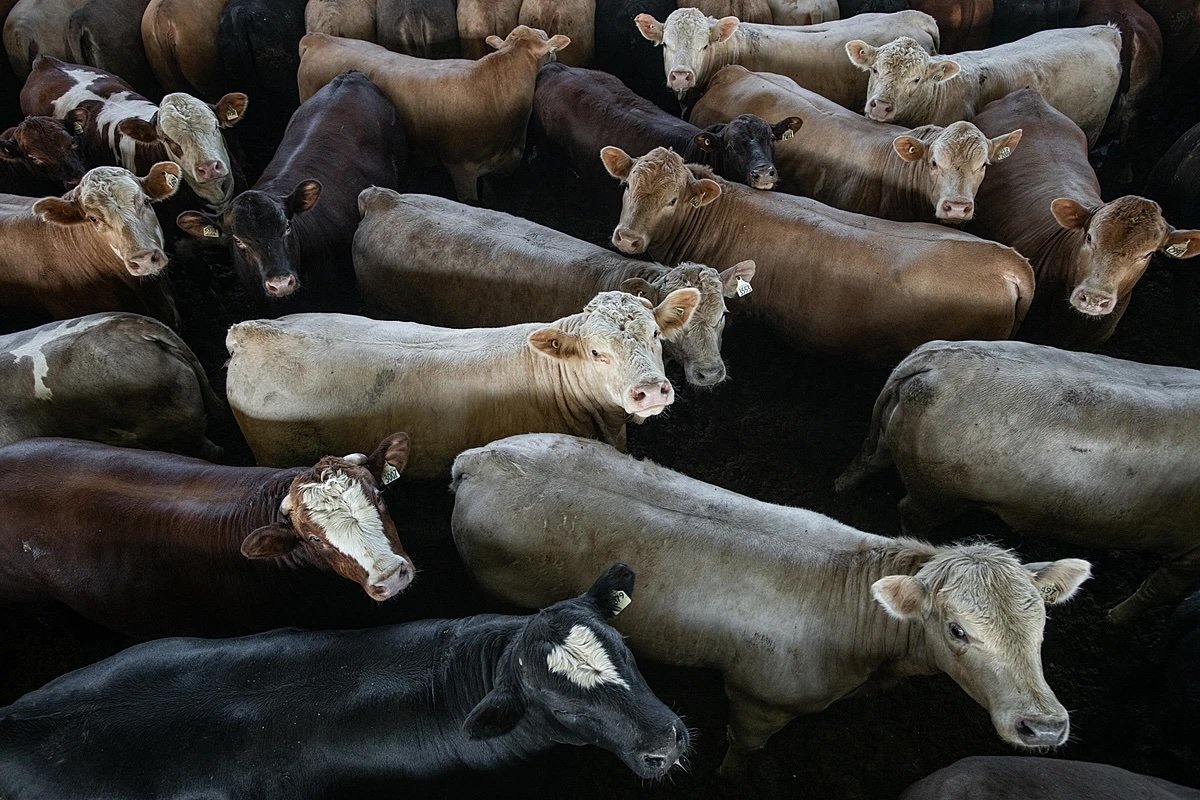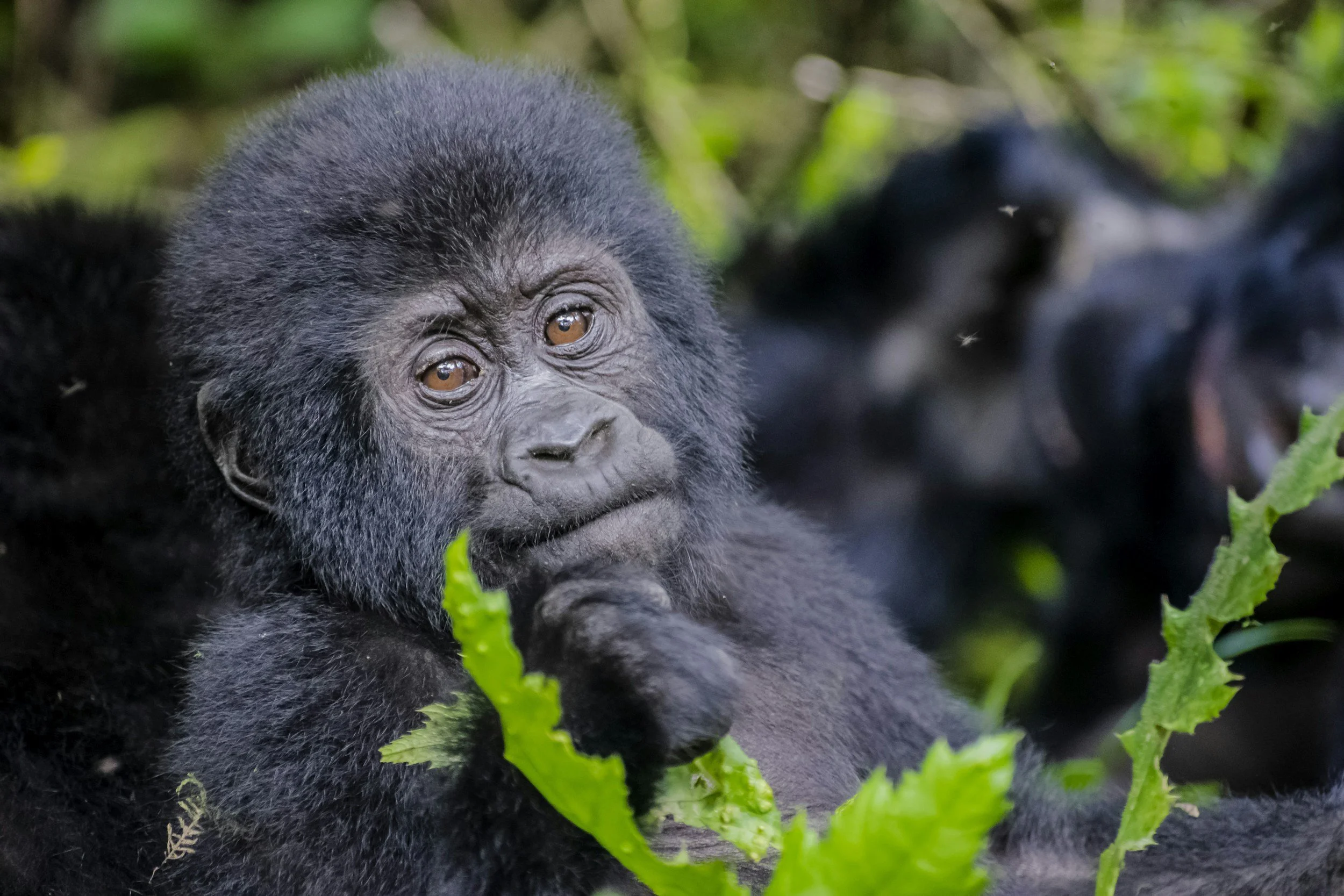Lobbyists to Push Pro-Meat Message at COP28 Climate Summit, Documents Reveal
Leaked files show strategic planning by corporations and lobby groups to go 'full force' in promoting meat consumption as both nutritious and environmentally sustainable.
Cattle living in a feedlot. Canada, 2022. Jo-Anne McArthur / We Animals Media
Major meat corporations and lobby groups are coordinating efforts to push the false narrative that meat is sustainable at the environmental conference COP28, amid growing awareness of the industry’s devastating impact on the climate.
Leaked documents, produced by the industry-funded Global Meat Alliance (GMA), reveal meat lobbyists’ communications strategy to “tell its story and tell it well” to policymakers at the climate summit.
According to the files seen by The Guardian and DeSmog, the world’s largest meat company JBS, which has annual revenues of more than $50 billion, and other huge industry players, including the Global Dairy Platform and the North American Meat Institute, are planning to push their pro-meat message with “full force”.
“These companies are stepping up their game because the exposure they are facing is stepping up,” Jennifer Jacquet, professor of environmental science and policy at the University of Miami told The Guardian. “It used to be that they were caught on the back foot, but now they’re completely prepared.”
Animal Agriculture’s Devastating Climate Impact
Scientists warn that unless rapid action is taken, emissions from our food system alone will tip the world beyond a 1.5C rise in temperature above pre industrial levels. This threshold marks a critical point that, if surpassed, predictions show that climate disasters will become so extreme that humans will not be able to adapt.
Whilst only providing 18 percent of our calories, animal agriculture is responsible for about 57 percent of the food production sector’s greenhouse gas emissions, exceeding that of the entire transportation industry. Despite this, animal farming received 1,200 times more public funding than new alternative protein sources, while in the US, they received 800 times more support.
Cattle living in a feedlot. Canada, 2022. Julie LP / We Animals Media
The five biggest animal-based producers combined, JBS, Tyson, Cargill, Dairy Farmers of America, and Fonterra, emit more greenhouse gas emissions than leading oil companies, ExxonMobil, Shell or BP, according to a 2018 report by US advocacy group GRAIN and think tank the US Institute for Agriculture and Trade Policy (IATP).
“Any credible action to reduce emissions in the food sector will inevitably lead to a reduction in the total volume of meat and dairy products produced,” Nusa Urbancic, CEO of campaign group the Changing Markets Foundation, told The Guardian. “The industry is terrified of that and has been deploying multiple tactics to delay the inevitable.”
Earlier this year, pressure from the animal agriculture industry led to the watering down of a crucially important report by the United Nations’ Intergovernmental Panel on Climate Change (IPCC).
The report initially pushed for a switch to plant-based diets, stating that “plant-based diets can reduce GHG emissions by up to 50 percent compared to the average emission-intensive Western diet,” according to leaked documents. However, as a result of vested interests, in the final text, the environmental impact of meat and the recommendation to shift to plant-based diets were scrapped.
COP28 Embracing Plant-Based Diets
In previous years, the UN conference has previously faced criticism for serving a meat-heavy menu during the event, with environmentalists equating it to “serving cigarettes at a lung cancer conference”.
Now, for the first time in the climate summit’s history, the menu will predominantly feature plant-based foods. In addition, the climate impact of meat and dairy is also making it onto the agenda, with the UN Food and Agriculture Organization (UN FAO) expected to publish a comprehensive roadmap on why reducing consumption of meat is crucial to meeting the Paris climate agreement goals. Nations with high consumption rates will be advised to limit their intake, while developing countries will need to improve their animal farming, according to the FAO.
In response, meat companies are working hard to convince key players at COP28 that meat is positive for the environment. According to the leaked report, animal agriculture companies and trade groups are also reportedly equipping their delegates that will be on the ground at COP28 with a pack providing them with “key messages and solutions” to “have the most influence”. These key communication messages include the notion that meat is “sustainable nutrition” and will help to “feed the world”.
“It is hard to understand why decision-makers would allow companies like JBS to have a seat at the table at climate negotiations,” said Urbancic. “They are simply not credible partners in these crucial talks, especially now when the time for action is rapidly running out.”
Research from the University of Oxford shows that going plant-based is the “single biggest way” to reduce your impact on the planet. Start your plant-based journey today by taking Species Unite’s 30-Day Challenge. Sign up for free to receive 30 days of support , tips, recipes, and inspiration.
We Have A Favor To Ask…
Species Unite amplifies well-researched solutions to some of the most abusive animal industries operating today.
At this crucial moment, with worldwide momentum for change building, it’s vital we share these animal-free solutions with the world - and we need your help.
We’re a nonprofit, and so to keep sharing these solutions, we’re relying on you - with your support, we can continue our essential work in growing a powerful community of animal advocates this year.
More stories:
Species Unite
A collection of stories of those who fight the good fight on behalf of animals.






A judge has issued Pennsylvania’s first habeas corpus order for a nonhuman animal, advancing NhRP’s fight to move five African elephants from the Pittsburgh Zoo to a sanctuary.